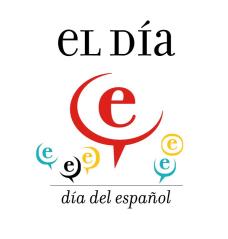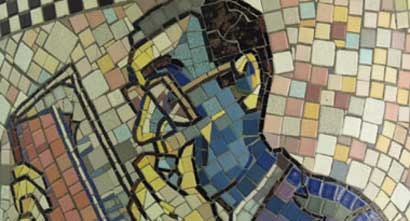The curious lives of Shakespeare and Cervantes
 A witty and energetic romp through the lives of two of history’s greatest writers, who died on the same date. We race through the lives of both these great historic figures, raking through their dirty laundry, failed marriages, brawls and successes, as they recite pieces from their own works and bring alive incidents from their personal stories through dance and song, comedy and drama, with the occasional piece of slapstick.
A witty and energetic romp through the lives of two of history’s greatest writers, who died on the same date. We race through the lives of both these great historic figures, raking through their dirty laundry, failed marriages, brawls and successes, as they recite pieces from their own works and bring alive incidents from their personal stories through dance and song, comedy and drama, with the occasional piece of slapstick.
How the British media views Spain
 ICLL Podcast series: New Episode (in English)
ICLL Podcast series: New Episode (in English)
Is British media coverage of Spain still dominated
by the old stereotypes? Or do the newspapers, TV
and radio now reflect more accurately the reality
of Spain as a modern European nation?
With social and commercial links between our two countries
stronger and more important than ever, this debate
will examine how Spain is perceived by Britain´s
media, and ask how Spain might improve its image
here.
Participants
Walter Oppenheimer
Jimmy Burns
Anna Bosch
Peter Preston
Jonathan Smith
Collaborating Organisation
El País (Madrid)
Embajada de España (Reino Unido)
Oficina de Información y Prensa (Londres)
Televisión Española (TVE)
TVE (Londres)
El Día del Español (El Día E) – Spanish Language Day – Saturday 19 June 2010

COME and join in the worldwide celebration of Spanish Language Day on Saturday June 19 as more than 70 Instituto Cervantes centres in 40 countries put on a host of special activities and entertainment.
Spanish is the official language of no fewer than 21 countries, so here in London we’re busy organising with ACALASP a programme that includes activities, exhibitions, demonstrations and music from several Latin American nations.
We’re also looking forward to the authentic flavours of Spain with gourmet tastings and workshops provided by Ibérica, one of London’s finest Spanish restaurants, and, of course, Wines From Spain. Pre-registration is ESSENTIAL for these tastings and workshops, which take place in the Eaton Square gardens between noon and 4pm. For full details see the Instituto Cervantes website.
But the main point of the day is the Spanish language, so we’ll be launching a ‘word shower’ to open the event at 10am, and offering activities including the Spanish Game, a crossword-type contest designed to test your Spanish skills.
And here’s the best bit … we’re offering all current Instituto Cervantes London students the chance to win a luxury tour of Andalucía, visiting all the major sights and staying in some of the region’s finest hotels.
Moor to it than meets the eye

“THERE’s no fate worse than being blind in Granada,” a Spanish saying goes. But not all eyes can read what they see.
Granada’s incredible Alhambra, probably the most famous monument in all of Spain, has long been an object of fascination for historians, writers, artists and people in general.
Yet this beautiful palace-fortress still hides thousands of secrets, in particular the Arabic inscriptions that were written centuries ago. In fact, efforts to translate and interpret these inscriptions began almost as soon as the last Moors left Granada in 1492 after the Catholic monarchs completed the Reconquista of Spain.
Just nine years later, in 1501, a translation institute was established in Spain. Naturally, much of its work involved translating the Arabic left behind by centuries of Moorish rule.
Ever since, countless experts and visitors have been trying to decipher the meanings of the inscriptions which cover so many of the Alhambra’s walls, roofs, arches and other features. Foreign travellers, in particular the British artists of the 18th century, also attempted to study and catalogue the many thousands of verses and sayings.
Unfortunately, these works either failed to truthfully represent what was found, or covered only small parts of the Alhambra. In other cases, sadly, the work was lost.
El español que nos une y nos diferencia
 ICLL Podcast series: New Episode (in Spanish)
ICLL Podcast series: New Episode (in Spanish)
El español que nos une y nos diferencia
Globalisation, human migration and the use of the Internet have reinforced Spanish as a language of international communication. At the same time, there are marked cultural differences among Spanish-speaking countries that influence the Spanish language and that, on occasion, distort communication.
What are the main differences between Peninsular Spanish and Latin American Spanish? On what linguistic level are they manifest? How do they affect communication and usage? On the 200th anniversary of Latin American Independence we have brought together two leading experts so that we can discuss our extensive common language that both unites and separates us.
In
Bicentenario de las indepencias en Hispanoamérica. series of talks
Participants
Francisco Moreno
Rosina Márquez-Reiter
Collaborating Organisation
Asociación de Consejeros Culturales de América Latina, España y Portugal / Association of Cultural Attaches of Latin America, Spain & Portugal (Londres)
Young Translators’ Prize
 In 2010 Harvill Secker celebrates 100 years of publishing quality international writing. In honour of this centenary, Harvill Secker and Waterstone’s have teamed up to recognise the achievements of young translators at the start of their careers.
In 2010 Harvill Secker celebrates 100 years of publishing quality international writing. In honour of this centenary, Harvill Secker and Waterstone’s have teamed up to recognise the achievements of young translators at the start of their careers.
Judges Margaret Jull Costa (translator), Nicholas Shakespeare (author), and Briony Everroad (editor) will carefully consider translations of ‘El hachazo’, a short story by the exciting young Argentinian writer Matías Néspolo.
The winning translator will be awarded £1000.
Deadline for entries: 31st July 2010.
To enter and for further information, please visit
www.harvillseckeryoungtranslatorsprize.com
or
«Travels in Portugal… and Spain» by H. F. Link
Following his interest in botany, entomology and ornithology, Henry Frederick Link visited Spain with the Count of Hoffmannfegg, in 1798. The origin of this journey was initially to do a research focused in Portugal, as Link himself underlines in the introduction of the book “to collect materials for Fauna and Flora Lusitaniae”.
However, his exploration spread out to Spain and France and he went beyond his scientific purpose and decided to write a travel book about these three countries.
“At the time we had no idea of publishing and account of our travels as such; our chief attention was directed to investigating the works of nature, especially the botanical riches of the country”
 Nevertheless on his return, after reading numerous accounts of travels in Portugal, Link discovered so many inaccuracies that he decided to “seize the pen to defend my friends the Portugueze” and wrote Travels in Portugal and through France and Spain. With a dissertation on the literature of Portugal, and the Spanish and Portugueze Languages.
Nevertheless on his return, after reading numerous accounts of travels in Portugal, Link discovered so many inaccuracies that he decided to “seize the pen to defend my friends the Portugueze” and wrote Travels in Portugal and through France and Spain. With a dissertation on the literature of Portugal, and the Spanish and Portugueze Languages.
Written in 1801 and translated from the German by John Hincley the copy available in our library was published that year by Nichols and Son Printers, in London. The information related to Spain is gathered in six chapters of the book (VII-XI), from Biscay to Extremadura, through Castile and Madrid.
USEFUL LINKS
About the author:
http://en.wikipedia.org/wiki/Johann_Heinrich_Friedrich_Link
About the book:
(pdf – page 18)
http://dialnet.unirioja.es/servlet/fichero_articulo?codigo=2857118&orden=0
Online book:
Club de lectura = Reading group
 El Colectivo invites you to the Reading Group that organizes in collaboration with the Instituto Cervantes. It offers you the opportunity to talk about and discuss Spanish and Latin American literature, imitating the traditional Spanish tertulia. The reading group meets one Friday per month at 6.30pm in the Instituto Cervantes; it is free to join and you are welcome to come along to any session. In order to participate, there is only one requirement: to have read the scheduled book.
El Colectivo invites you to the Reading Group that organizes in collaboration with the Instituto Cervantes. It offers you the opportunity to talk about and discuss Spanish and Latin American literature, imitating the traditional Spanish tertulia. The reading group meets one Friday per month at 6.30pm in the Instituto Cervantes; it is free to join and you are welcome to come along to any session. In order to participate, there is only one requirement: to have read the scheduled book.- Todas las almas de Javier Marías -26 de marzo, 6.30pm
- El olvido que seremos de Héctor Abad -23 de abril, 6.30pm
- La virgen de los sicarios de Fernando Vallejo -28 mayo, 6.30pm
-
El mundo de Juan José Millás -25 junio, 6.30pm
-
La invención de Morel de Bioy Casares -16 julio, 6.30pm
Laughing over lemons
 WE DON’T do stand-up comedy at the Instituto Cervantes, we don’t even do sit-down comedy very often, but last night’s audience with Chris ‘Driving Over Lemons’ Stewart was the funniest evening LondonSpanish has had for some time.
WE DON’T do stand-up comedy at the Instituto Cervantes, we don’t even do sit-down comedy very often, but last night’s audience with Chris ‘Driving Over Lemons’ Stewart was the funniest evening LondonSpanish has had for some time.
Chris proved he is just as witty a speaker as he is a writer, and another packed house was soon laughing along as he recounted his latest adventures and embarrassments in the Alpujarras. Like the rest of Andalusia, the area has seen rainfall of epic proportions in the past few months, and Chris told how a flood swept away one of its many ham-curing houses.
Locals gathered downstream hoping to salvage some of the contents as they were washed up – only to find the meat had been smashed away by the torrent and just bones remained. As Chris would later point out, mountain people are a little, um, different.
The Silent Revolution
ICLL Podcast series: New Episode (in Spanish)
The Silent Revolution
 Graphic design between 1920 and 1950 constituted a means of distribution for aesthetic and political avant-garde ideas. In contrast with the Muralist movement, its presence was rather more modest but its scope was wider.
Graphic design between 1920 and 1950 constituted a means of distribution for aesthetic and political avant-garde ideas. In contrast with the Muralist movement, its presence was rather more modest but its scope was wider.
While the muralists were painting their masterpieces on official buildings, graphic art was being distributed through educational channels and channels for literacy campaigns all over the country. Some of the best artists participated in this work: Leopoldo Méndez, Alvarado Lang, Jean Charlot, Emilio Amero.
Small print production cooperatives such as Escuelas al Aire Libre, Taller de la Gráfica Popular (TGP) and artistic movements such as Los Estridentistas emerged.
Participants
José Manuel Springer
Collaborating Organisation
Embajada de México (Reino Unido)



